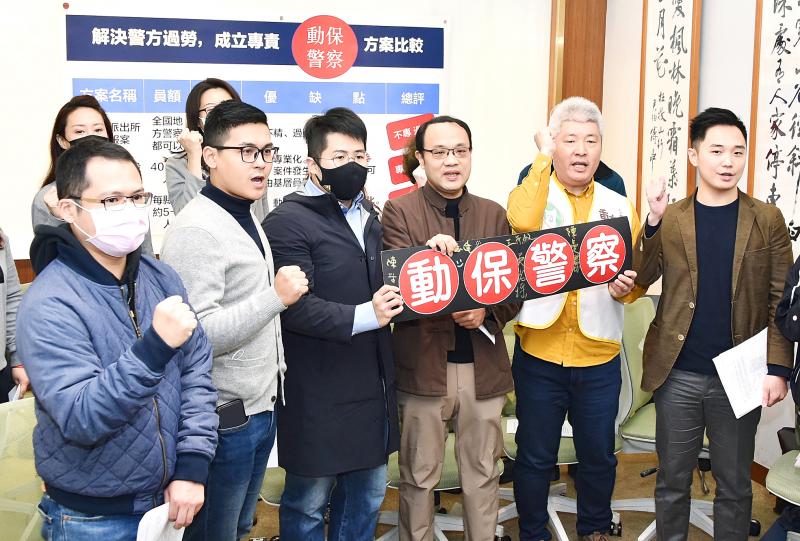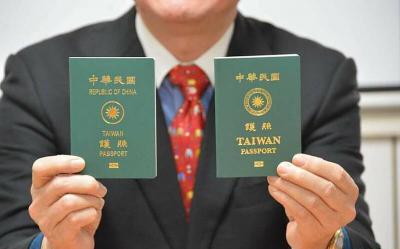Academics and animal rights advocates yesterday called on the government to create an animal protection police unit, due to an increase in reports of cruelty and violence against pets and wild animals in the past few years.
Taiwan Animal Protection Monitor Network secretary-general Ho Tsung-hsun lead a media briefing at the Legislative Yuan in Taipei organized by a coalition of animal welfare organizations and civic groups.
Ho said that lawmakers in 2017 passed amendments to the Animal Protection Act (動物保護法), which imposed more severe penalties for cruelty to, or mistreatment or killing of animals.

Photo: Tu Chien-jung, Taipei Times
However, government leaders have still not established a specialized force to investigate such offenses, he said.
“Our society is much improved ... regarding protection and conservation measures for animals, as well as showing concern and reporting people who abuse or kill animals,” Ho said. “It is also an ethical issue, as animals are unable to talk ... so we have to speak up for them.”
“We have a general consensus in society and among all political parties, that an animal protection unit should be established, but National Police Agency [NPA] officials keep telling us that they have no budget and no spare personnel, so cases such as the beating and poisoning of animals are still being handled by rank-and-file officers at local police stations,” he said.
When arriving on the scene, local police most often record such incidents as a case of “animal welfare and protection,” Ho said.
They then pass it on to agencies that fall under the Council of Agriculture, which deal with livestock and wild animals, and nothing is done, because the legal jurisdictions are not clearly defined, and neither the police nor the agencies are willing to shoulder the responsibility of taking on the case, Ho said.
Special training is required to deal with disputes over pets, feral animals, or when snakes, bees or hornets are found in homes, so a dedicated police force is needed for such jobs, and for investigating criminal offenses against animals, Ho and other advocates said.
Wu Chuang-hsien (吳宗憲), a professor at the National University of Tainan who has studied the issue, said that a specialized animal protection unit could be set up under the control of local governments, patterned after the women and children’s protection units at most local police precincts.
Wu said that another feasible option would be to place the unit under the central government’s control under the NPA, modeling it after NPA’s Seventh Special Police Corps, which deals with nature conservation, environmental protection, and security at national parks and forest preserves.
Other speakers at yesterday’s briefing included representatives from the Environment and Animal Society of Taiwan, the Taiwan Society for the Prevention of Cruelty to Animals, the Life Conservation Society, the Animal Protection Association and the World Dog Alliance, as well as youth representatives from major political parties.

A fugitive in a suspected cosmetic surgery fraud case today returned to Taiwan from Canada, after being wanted for six years. Internet celebrity Su Chen-tuan (蘇陳端), known as Lady Nai Nai (貴婦奈奈), and her former boyfriend, plastic surgeon Paul Huang (黃博健), allegedly defrauded clients and friends of about NT$1 billion (US$30.66 million). Su was put on a wanted list in 2019 when she lived in Toronto, Canada, after failing to respond to subpoenas and arrest warrants from the Taipei District Prosecutors’ Office. Su arrived at Taiwan Taoyuan International Airport at 5am today on an EVA Air flight accompanied by a

COVID-19 infections have climbed for three consecutive weeks and are likely to reach another peak between next month and June, the Centers for Disease Control (CDC) said yesterday. Weekly hospital visits for the disease increased by 19 percent from the previous week, CDC Epidemic Intelligence Center Director Guo Hung-wei (郭宏偉) said. From Tuesday last week to yesterday, 21 cases of severe COVID-19 and seven deaths were confirmed, and from Sept. 1 last year to yesterday, there were 600 cases and 129 deaths, he said. From Oct. 1 last year to yesterday, 95.9 percent of the severe cases and 96.7 percent of the deaths

Restarting the No. 2 reactor at the Ma-anshan Nuclear Power Plant would take up to 18 months, Minister of Economic Affairs J.W. Kuo (郭智輝) said today. Kuo was answering questions during a meeting of the Legislative Yuan’s Economics Committee, where legislators are considering amendments to the Renewable Energy Development Act (再生能源發展條) amid concerns about the consequences of the Pingtung County reactor’s decommissioning scheduled for May 17. Its decommissioning is to mark the end of Taiwan’s nuclear power production. However, Chinese Nationalist Party (KMT) lawmakers have proposed an amendment to the Nuclear Reactor Facilities Regulation Act (核子反應器設施管制法) that would extend the life of existing

The Ministry of Foreign Affairs yesterday demanded that Somalia reverse its decision prohibiting Taiwanese passport holders from entering or transiting through the country. Somalia said it is following the “one China” principle based on UN Resolution 2758. The ministry said that Somalia is misinterpreting the resolution under China’s instigation, creating a false impression that Taiwan is subordinate to China. The Somali Civil Aviation Authority told airlines on Tuesday last week that starting today, any passengers with passports or travel documents issued from Taiwan or its affiliated institutions would not be allowed to enter or transit through Somalia. The decision comes as Taiwan is boosting